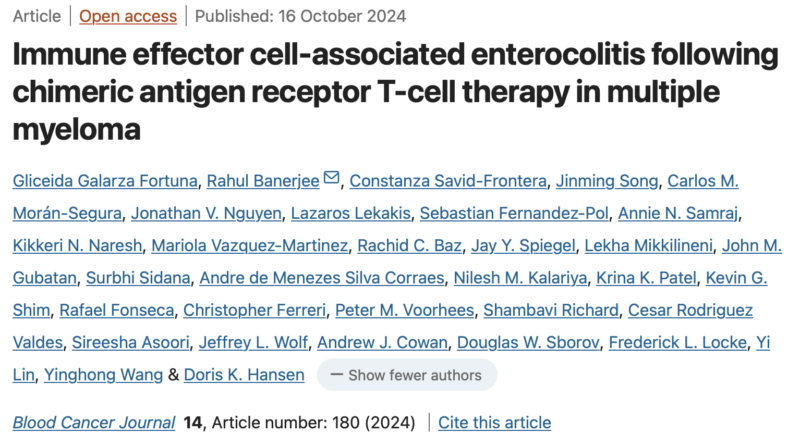Rahul Banerjee shared a post on X, about recent paper published in Blood Cancer Journal:
Authors: Gliceida Galarza Fortuna, Rahul Banerjee, Constanza Savid-Frontera, Jinming Song, Carlos M. Morán-Segura, Jonathan V. Nguyen, Lazaros Lekakis, Sebastian Fernandez-Pol, Annie N. Samraj, Kikkeri N. Naresh, Mariola Vazquez-Martinez, Rachid C. Baz, Jay Y. Spiegel, Lekha Mikkilineni, John M. Gubatan, Surbhi Sidana, Andre de Menezes Silva Corraes, Nilesh M. Kalariya, Krina K. Patel, Kevin G. Shim, Rafael Fonseca, Christopher Ferreri, Peter M. Voorhees, Shambavi Richard, Cesar Rodriguez Valdes, Sireesha Asoori, Jeffrey L. Wolf, Andrew J. Cowan, Douglas W. Sborov, Frederick L. Locke, Yi Lin, Yinghong Wang, Doris K. Hansen.

”Now in Blood Cancer Journal – our multicenter description of immune effector cell-associated (IEC-associated) enterocolitis as a novel toxicity of CAR T-cell therapy in multiple myeloma. Typically non-bloody Grade 3 or higher diarrhea starting approximately three months after idecabtagene vicleucel or cilta-cel: 36% of cases fatal in our series (n=14).
Diagnosing immune effector cell-associated enterocolitis following B-cell maturation antigen CAR T-cell therapy in multiple myeloma:
- Symptoms: Diarrhea with or without abdominal pain, generally after patients are discharged to their primary oncologist.
- Imaging: Normal, but sometimes shows pneumatosis.
- Upper or lower gastrointestinal biopsies: Resemble graft-versus-host disease following allogeneic hematopoietic cell transplantation.
Thanks to the excellent work by the Moffitt Cancer Center team including Frederick L. Locke, chimeric antigen receptor positive T-cell infiltration into the duodenum was seen in one case of immune effector cell-associated enterocolitis (including variable heavy chain cilta-cel stains).
We cannot definitively rule out a lymphoproliferative process with this alone, but it seems polyclonal.
The mechanism of immune effector cell-associated enterocolitis in multiple myeloma is unclear.
We do not think it is as simple as on-target off-tumor targeting in the gut: B-cell maturation antigen levels are also similar in the tonsils.
Perhaps it is something similar to common variable immunodeficiency from depletion of immunoglobulin A plasma cells in the gut? It is unclear why it is so rare.
Source: Rahul Banerjee/X
Rahul Banerjee is an assistant professor at Fred Hutchinson Cancer Center at the University of Washington. He completed his residency from the University of Pennsylvania health system. He completed his fellowship in haematology and oncology from University of California, San Francisco. He has authored over 70-peer reviewed publications. His clinical interests include multiple myeloma.


